For military families, on the move every couple years, getting somebody to stop and listen can be a challenge, military spouses at a Jill Biden campaign event agreed.
“Military families are so used to just sucking it up that we’re not always being heard,” Jennifer Bennett said as she headed home from the small gathering in Norfolk’s Glengariff neighborhood.
Biden, making a swing Thursday through Hampton Roads and Richmond, told a small group of socially distanced military spouses that she planned to re-launch the “Joining Together” initiative she and Michelle Obama started.
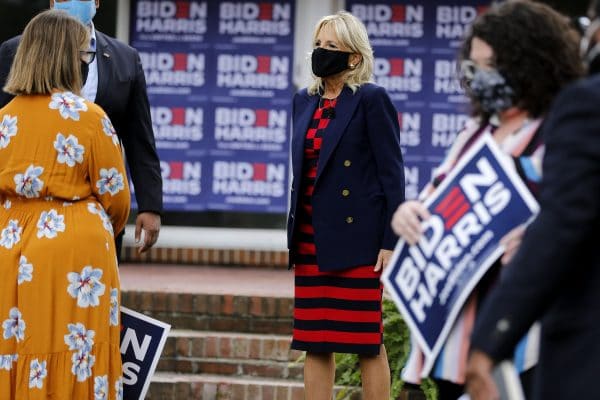
Dr. Jill Biden speaks with military families outside of a private residence in Norfolk Thursday afternoon September 24, 2020.
(Jonathon Gruenke/Daily Press/TNS)
“That first day that Barack and Michelle and Joe and I got together, Michelle said to me: ‘If we win, if we win, what do you want to take on?’ And I said ‘You know what, Michelle, I want to work to support military families.’ And she said: ‘So do I!,’” Biden said.
“I feel like we’re family,” Biden said, remembering late stepson Beau’s Army National Guard service in Iraq and how her World War II veteran dad used to put flags out on holidays, play John Philip Sousa marches on the record player and take the family to watch the Navy Blue Angels aerobatics team every year.
She said when she visited Iraq, she heard a story about a little girl who burst into tears when “Ave Maria” was played at a Christmas party, telling a teacher that it was the music played at her soldier-father’s funeral.
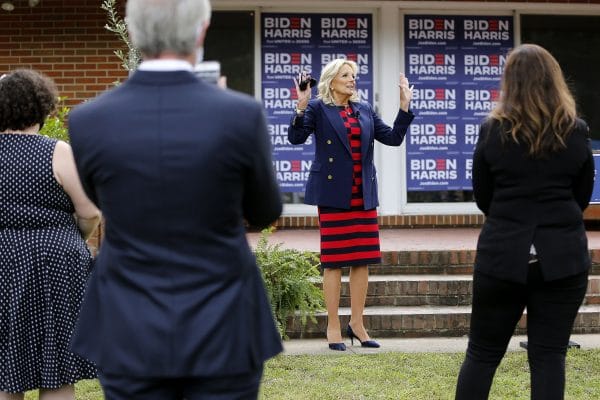
Dr. Jill Biden speaks with military families outside of a private residence in Norfolk Thursday afternoon September 24, 2020.
(Jonathon Gruenke/Daily Press/TNS)
That sparked the Joining Together initiative’s “Educating Educators” push, to boost awareness of the distinctive needs and concerns of children of servicemen and women, especially those serving overseas,
Biden said she’s still proud of the health care and children’s issues Joining Together tackled — and, after her brief remarks, heard that many of those issues remain.
For Bennett, the Navy’s often demanding deployment schedules pose stresses that better mental health and behavioral treatment services could help.
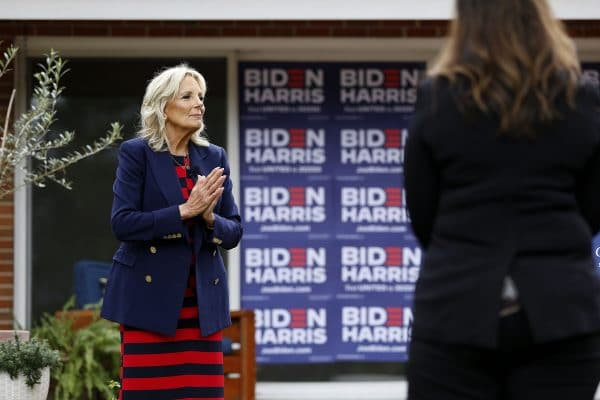
Dr. Jill Biden speaks with military families outside of a private residence in Norfolk Thursday afternoon September 24, 2020.
(Jonathon Gruenke/Daily Press/TNS)
Healthcare was the issue when Biden paused for a chat with Lexi Fontaine.
Fontaine is an Air Force spouse who has had to struggle finding care for her multiple sclerosis and a still-undiagnosed condition through several transfers with a husband who has been deployed overseas for about half their marriage.
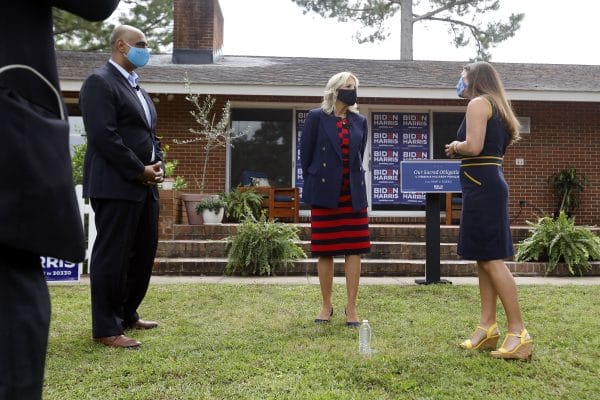
Missy Cotter Smasal, right, speaks with Jill Biden after meeting with military families outside of a private residence in Norfolk Thursday afternoon September 24, 2020.
(Jonathon Gruenke/Daily Press/TNS)
Part of that issue is continuity — questions and concerns that get lost in the shuffle with frequent moves. Another is access to the more specialized care that some military family members require, and what Tricare will cover.
“I’ve got a geneticist appointment next week — I’ve been trying to get that for five years,” she said.
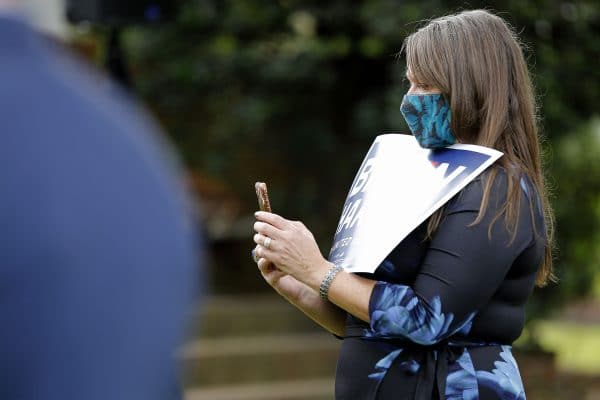
Jennifer Bennett talks a cellphone picture as Jill Biden arrives to speak with military families outside of a private residence in Norfolk Thursday afternoon September 24, 2020.
(Jonathon Gruenke/Daily Press/TNS)
Michelle Norman, another Navy spouse, said frequent moves pose a major challenge for children in special education programs. Typically, each new school wants to do its own assessments — and sometimes, Navy parents feel, the aim is to not take on too much for a family that might be in the community for only a little while.
“I’m hoping we can have a voice,” she said.
Being listened to is the most important thing, Air Force spouse Lindesy Puckett. That’s what Joining Together accomplished, she added.
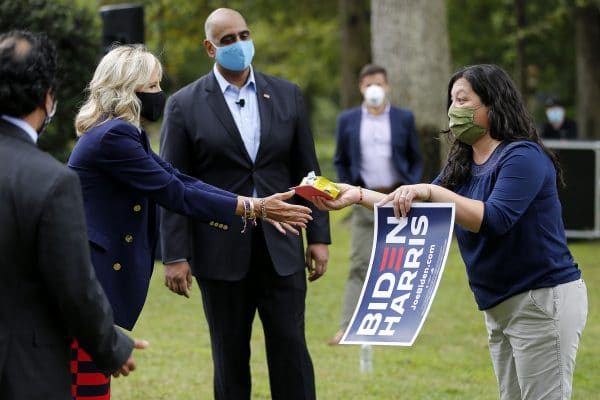
Jennifer Marin gives Puerto Rican coffee as a gift to Jill Biden after she spoke to military families outside of a private residence in Norfolk Thursday afternoon September 24, 2020.
(Jonathon Gruenke/Daily Press/TNS)
“I mostly just wanted to say thank you,” she said.
President Trump’s re-election campaign has said military families have been a focus of his administration, citing an executive order prioritizing the hiring of military spouses and family support measures in the 2020 National Defense Authorization Act.
___
© 2020 the Daily Press
Distributed by Tribune Content Agency, LLC.



